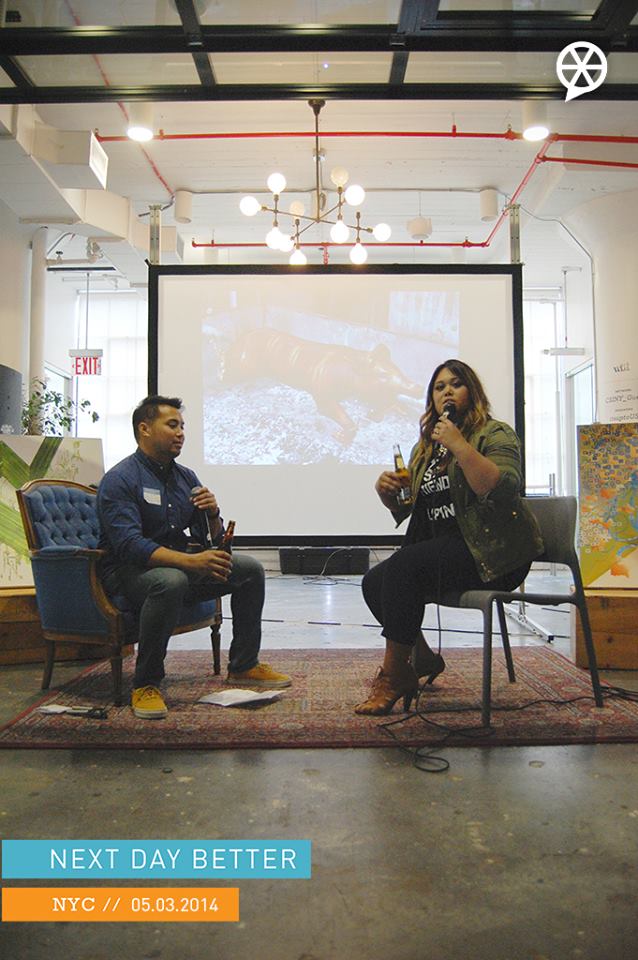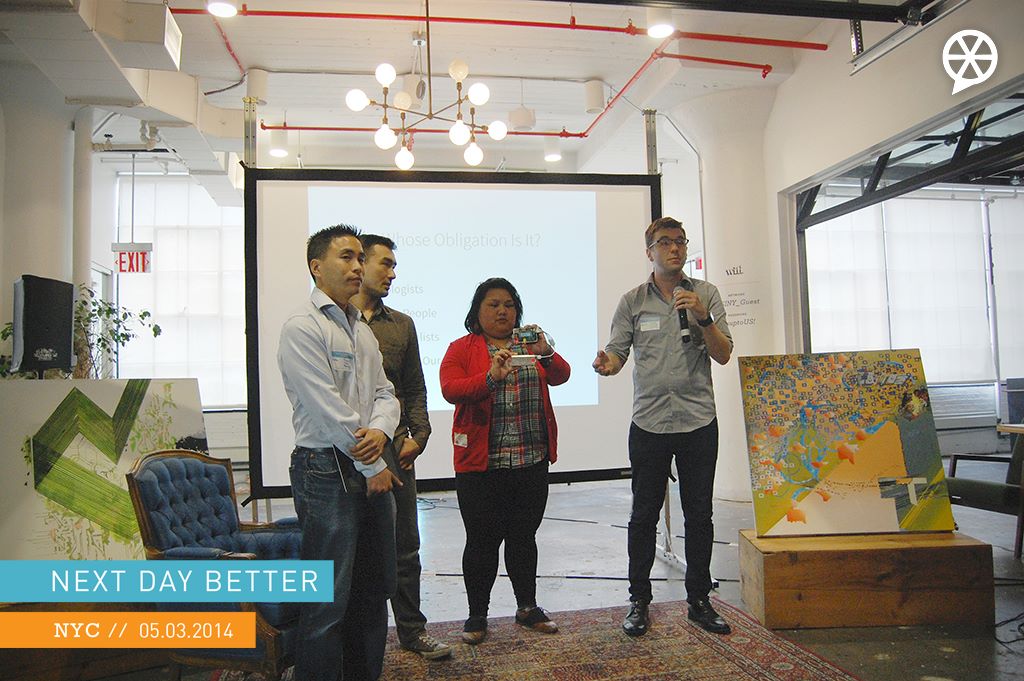By Rexy Josh Dorado, guest contributor

"Back when I was still studying to become an environmental engineer," says Aldric Ulep, "I took a class on renewable energy that sparked a realization."
Despite the waves of technological progress that have rocked the recent decades, society remained stuck in its own inertia - in the web of politics and economics that prevented requisite action from taking form. This was where Aldric found his voice. There, coiled around questions of justice and community that he explored through the lens of his public policy degree on one hand, and his leadership position in Stanford's Pilipino American Student Union (PASU) on the other. These separate threads came together in the wake of Typhoon Yolanda: an unexpected signal of the potential in combining his environmental policy research interests with aspirations to empower vulnerable Filipino communities.
On the opposite coast of the US, we meet Gianina Yumul, two years into her History of Art and Architecture concentration at Harvard College. With this, she is hoping to provide accessible education through the arts, and to further the fight against education inequality and its crooked intersections with socioeconomic disparities.
She's spent the past few years pursuing this calling in the US. A recent winter break service trip in the Philippines has ignited something in her: a pull to explore dimensions of her identity that have always been there but, never as close to the forefront until her visit this past January. As the new Service Director of the Harvard Philippine Forum and a steering committee member of the same trip next year, she's gearing to spread the opportunity she's been given. In the meantime, she has questions to puzzle through herself.
"I'm wary of the savior complex and I worry about the ways in which Filipino-Americans can be integrated into the Filipino community in the sense of social entrepreneurship," she says. And even as Aldric continues to grow more comfortable his Filipino American identity, he too has a ways to go before he can really know the Philippines:
"I'm struggling to claim it as my piece of the human puzzle; I have my own strengths and fights," he adds.
This summer, Aldric will be exploring these questions and more alongside Kalsada, an early stage venture that aims to advance grassroots economic development and environmental sustainability in the Philippines through the supply of quality coffee. And Gianina will be interning with Edukasyon.PH, a social enterprise that aims to connect Filipinos to higher education resources in the Philippines and around the world. Along with several other emerging leaders from the Filipino diaspora, they will be forming the first class of Kaya Collaborative fellows: the beginnings of a coalition of diaspora youth committed to leveraging their transnational positions for development in the homeland.
Kaya Co. fellows will spend ten weeks in the summer immersed in an experience that centers on an internship with a locally-led social venture in Manila. Fellows will also be taken through a series of workshops and discussions around models of change in the Philippine context, and will conduct research to inform new products and platforms that connect the Filipino diaspora to genuine and lasting change in the Philippines.
This experience was made possible in by Ayala Foundation, Inc., Brown University, and a fiscal sponsorship by Ashoka Youth Venture. Keep an eye out as our fellows share their experience this summer – as they grapple with questions of identity, development, and justice, and how to bring their diaspora communities into the fold.
In the meantime, read more of their stories below:
Alfred Dicioco graduated from the University of Southern California in 2012, and has since worked as a reporter for Alhambra Source, Inquirer, and Rappler around the issues that face Filipino Americans. For most of his life prior to college, he lived in Quezon City, where he'll be making his return to work with TIGRA, an organization that aims to redirect remittances towards the development of the Philippine solidarity economy.
AnneMarie Ladlad is a junior at Seattle University studying Humanities and Strategic Communication. She is currently Vice President of Seattle U's United Filipino Club, and this summer, she'll be bringing her skills in public relations and her budding interest in social entrepreneurship to Route +63, a social enterprise that arranges tours to promote economic development around the country.
April Alcantara is a sophomore studying Human Biology on the pre-med track at Stanford University. Among the defining parts of her college experience has been as the co-chair of Kayumanggi, Stanford PASU's dance troupe, where she learned the value of cultural community and explored new dimensions of her Filipina-American identity. She will be working with Kythe Foundation, an organization founded by the Philippines' first and only Ashoka fellow to provide psychosocial support systems for children with chronic illnesses.
Connie Truong is an aspiring activist completing her freshman year at Wellesley College. After spending most of her high school years facilitating dialogue about race relations in Massachusetts, she is now pursuing a degree in Peace and Justice Studies, a topic that she hopes to explore alongside Hope in a Bottle, a social business that sells bottled water to build schools in the country's underserved communities.
Danielle Peterson is a freshman from Brown University studying Biology and pursuing the pre-med track. She is hoping to tie her interests in medicine to systems-based approaches that attack root causes of instability and vulnerability in the Philippines. Danielle is excited to spend the summer working with Unlad Kabayan to connect migrants to homeland development, and to take the lessons from her experience back to the Filipino Alliance student community this fall.
Erlinda Delacruz is a 2013 graduate of Boston College. In her undergraduate years, she balanced her studies in Sociology and Film with her Chair position in District One of the Filipino Intercollegiate Networking Dialogue (FIND), an experience that has left an unshakeable mark on her understanding of herself as a leader and a Filipina. She will be working with Move.org Foundation to provide quality education to low-income children in Habitat for Humanity communities.
Julmar Carcedo is a sophomore studying International Relations at Brown University. He simultaneously lived and studied the Filipino diaspora experience at the United World College in Hong Kong, and has continued to advocate for Filipino culture and Philippine development through his involvement with Brown's Filipino Alliance and its Third World Center. He will be interning with PULSE, an organization that's working to promote sustainable economic growth through the development of Manila's creative sector.
Micaela Beltran is a freshman at Georgetown University pursuing a degree in Economics and English. A believer in the power of business acumen and cross-sectoral collaborations to effect social change, she will spend the summer interning with Ashoka Philippines, part of the world's largest network of social entrepreneurs, to create a fuller ecosystem of support and growth for local Filipino change-makers.
Mika Reyes is a freshman at Wesleyan University and her interests span the spectrum of economics, psychology, writing and education. Her first year in college is her first year living away from the Philippines, and she will be finding her new identity as a balikbayan alongside Gifts&Graces, a venture that provides market access to marginalized communities in the Philippines.
Nicole Salvador has spent her three years at Brown University - and the summers in between - exploring different channels of intercultural exchange. This journey has brought her to her current role leading Brown's Portuguese department and the campus chapter of Learning Enterprises, and this summer she will be circling back to her Filipina heritage through an internship with Rags2Riches, a "stylish social statement" that raises livelihoods for women in the Philippines through market access and income generation.
Payton Fugate-Laus will be graduating from Ohio State University in May. She is interested in integrated marketing and design, and has been seeking an outlet to connect these passions to social issues in the Philippines. This summer, she will be working alongside Bantay.PH, an organization that tackles frontline government corruption through information design and human-driven systems of accountability.
Sarah Lynne Peñalosa is a sophomore studying Humanities for Teaching at Seattle University. Her ultimate ambition is to be a social studies teacher, a vocation through which she hopes to educate and empower children around issues of diversity and social justice. She will be working with Teach for the Philippines, a member of the Teach for All network, which aims to provide inclusive, relevant, and excellent education for all Filipino children.











